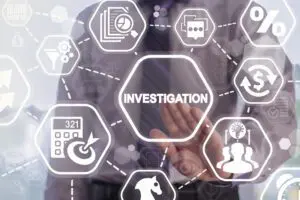
A workplace investigation, sometimes known as a whistleblowing investigation, is a process conducted by an employer to address complaints or concerns related to workplace misconduct.
The purpose of a workplace investigation is to gather relevant information, interview witnesses, and assess evidence to determine the facts of the situation. This process helps employers make informed decisions about how to address the issue and take appropriate corrective action if necessary.
Workplace investigations are important for maintaining a safe and respectful work environment, protecting employees’ rights, and ensuring compliance with legal requirements. Conducting a thorough and impartial investigation is crucial to resolving conflicts, preventing future incidents, and promoting a positive workplace culture based on trust and accountability.

Who conducts a workplace investigation?
A workplace investigation is typically conducted by a designated individual or team within the organisation, such as human resources professionals, compliance officers. Alternatively, organisations can consult a dedicated external investigator hired by the company to carry out the whistleblowing investigation.
The person leading the whistleblowing investigation should be impartial, objective, and have the necessary skills and training to gather information, interview witnesses, and analyse evidence effectively. It is important for the investigator to maintain confidentiality, follow established procedures, and adhere to legal requirements throughout the investigation process.
Our recent research, via our ‘Safecall Management Survey’ found that, when it came to workplace investigations:
- 11% of organisations use trained external investigators for workplace investigations
- 39% of organisations use a trained internal investigator
- 46% of organisations use an internal investigator without formal training
Many organisations are running the risk of their investigations being conducted by someone without sufficient training and experience.
What is the objective of a workplace investigation?
The goal is to ensure a fair and thorough examination of the issues at hand. Investigations seek to identify any violations of company policies or laws. They can be used to recommend appropriate actions to address the situation. By entrusting the investigation to qualified individuals, organisations can demonstrate their commitment to upholding a safe and respectful work environment for all employees.
What types of issues does a workplace investigation usually cover?
Workplace investigations can cover a wide range of issues related to workplace misconduct, violations of company policies, and legal compliance. Some common issues that may be subject to a workplace investigation include allegations of:
- harassment
- discrimination
- retaliation
- bullying
- fraud
- theft
- conflicts of interest
- safety violations
- substance abuse
- data breaches
The scope of workplace investigations is broad and can encompass various types of workplace issues that impact the well-being of employees and the overall functioning of the organisation.
What are the steps in a workplace investigation?
Receiving reports
In order for an investigation to be conducted, there first needs to be a report made. It’s crucial to ensure employee confidence in reporting systems is optimised.
Companies can engender trust in their reporting systems by fostering a workplace culture that values transparency, accountability, and ethical behaviour. This involves creating an environment where employees feel safe and supported in reporting misconduct without fear of retaliation. Leadership plays a crucial role in setting the tone for ethical conduct and demonstrating a commitment to addressing concerns seriously.
Additionally, companies can implement operational measures to enhance trust in reporting systems. Ensuring anonymity for whistleblowers, providing easy access to reporting channels (for example, an external whistleblower hotline), offering multilingual support, and ensuring compatibility across various devices for reporting convenience can help achieve this
By combining both cultural initiatives and operational measures, companies can build a robust reporting system that promotes trust, encourages transparency, and safeguards the well-being of employees.
Handling a report: Triage and assessment
Once a report has been received, the next step is to process and assess it, taking into consideration its:
- Severity.
- Credibility.
Once you have this information, an appropriate course of action must be decided upon. A timely response to a whistleblowing report is essential to maintain trust in the reporting system.
At this stage, it may be decided that an investigation must take place.
Organisations should make the decision to launch a formal workplace investigation into a report of wrongdoing based on several factors and criteria. The decision should consider the severity and credibility of the reported issue, as well as the potential impact on employees, the organisation, and its stakeholders. Criteria that may need to be met before initiating an investigation include the nature and scale of the concern, the level of risk involved, legal requirements, company policies, and ethical considerations.
Organisations may consider whether the reported misconduct violates company policies or laws, poses a threat to employee safety or well-being, or could result in reputational damage. If the decision to investigate is made, a prompt and thorough response is key to maintain trust in the reporting system and uphold a culture of accountability.
Taking action: finding the best approach
The decision has been made to launch an investigation. The next natural thing to consider is: what does that investigation look like?
Organisations decide on the form of their workplace investigation based on various factors such as the nature and complexity of the issue, available resources, expertise, and the level of impartiality. Internal investigations are typically conducted by designated individuals within the organisation when the issue is less severe and can be handled effectively in-house.
External providers, such as Safecall, come into play when organisations need independent scrutiny, specialised skills, or additional resources for more complex or sensitive cases. These external investigators can enhance trust in the investigation process and ensure thoroughness and impartiality.
Organisations should consider seeking external investigation support when they lack the internal expertise or resources to conduct a comprehensive investigation. Complete outsourcing of an investigation may be necessary for high-stakes situations where independence and specialised skills are crucial for engendering trust and confidence from employees.
Decision Making and Resolution
Once an investigation has been completed, organisations must decide on a course of action to take. The decision is typically made by organisational leadership or a designated decision-making body.
It’s important that an investigator communicates their findings clearly and objectively to support informed decision-making. When determining appropriate disciplinary actions and corrective measures, it’s crucial to consider the findings of the investigation, relevant policies and regulations, and the overall goals of the organisation.
Post Investigation
Monitoring the long-term outcomes of an investigation is crucial for organisations to ensure that corrective actions are effectively implemented and to assess the impact on organisational culture. By establishing feedback loops, organisations can improve their whistleblowing process and prevent future misconduct. This ongoing monitoring helps organisations learn from past investigations and continuously enhance their post-investigation processes.
Workplace investigations: Best Practice
Investigations often determine an organisation’s response to a report of wrongdoing so it’s important they’re conducted with care and diligence.
When conducting a workplace investigation, it is essential to adhere to best practices to ensure fairness, thoroughness, and integrity in the process. Here are some key pieces of advice and insights:
- Conduct fair, unbiased, and thorough investigations: Ensure that all parties involved are treated with impartiality and that the investigation is conducted diligently to uncover the facts of the situation.
- Selection of the investigation team: Choose individuals with the necessary skills, training, and objectivity to lead the investigation effectively. The team should be well-equipped to gather information, interview witnesses, and analyse evidence.
- Evidence collection: Collect and document all relevant evidence meticulously to support the findings of the investigation. Properly handling and preserving evidence is crucial for the credibility of the investigation.
- Witness interviews: Conduct interviews with witnesses in a professional and respectful manner. Encourage open communication and provide a safe space for witnesses to share their perspectives without fear of retaliation.
- Strategies to ensure confidentiality and protect against retaliation: Maintain strict confidentiality throughout the investigation process to protect the privacy of those involved. Implement measures to safeguard whistleblowers and witnesses from any form of retaliation for their cooperation.
Why choose Safecall?
At Safecall, we offer expertise and experience. All of our investigators have significant investigative experience typically having operated at Senior Investigating Officer level within the police service or similar level in other organisations
Our best-in-class workplace investigation services are characterised by their:
Independence
Conducting workplace investigations in a fair, transparent, and proportionate manner is crucial to prevent business liability, reputational damage, and further complications for all parties involved. Safecall stands out as a leading independent provider of whistleblowing systems, training, and investigations, ensuring an unbiased and impartial approach to handling sensitive workplace issues.
Expertise and Experience
Employers must adhere to proper procedures to conduct investigations correctly and avoid potential legal challenges. Safecall offers extensive expertise and experience in navigating investigation procedures and processes. He have a proven track record of conducting thorough and effective workplace investigations. Our team is well-versed in handling investigations within various workplace settings. We provide the necessary skills and knowledge to address complex issues professionally.
On-Demand Capacity
Not all employers or organisations have the resources or time to swiftly and efficiently conduct workplace investigations. Safecall offers flexible on-demand investigator and interviewer capacity. Our clients cantailor the level of investigative support needed based on their specific requirements. This on-demand approach ensures that investigations can be initiated promptly and conducted effectively without unnecessary delays.
Dedicated Focus
Achieving successful resolutions for whistleblower reports necessitates an efficient and focused response. Our services include providing a dedicated and experienced investigator who will manage all aspects of your investigation.
Agreed Investigative Parameters in Advance
To prevent scope creep in investigations, we establish terms of reference in advance. This is through mutual agreement between the client sponsor and the investigator.
Need help with your workplace investigation?
Call us today on +44 (0) 191516 7720
Free investigation resources
Investigations Resource Centre
Free short videos: workplace investigation advice and guidance from the UK experts
Free investigation decision making checklist
Training
Investigation Training (Investigations course, Investigation skills training, Investigator training and HR investigation training)
Whistleblowing elearning for managers